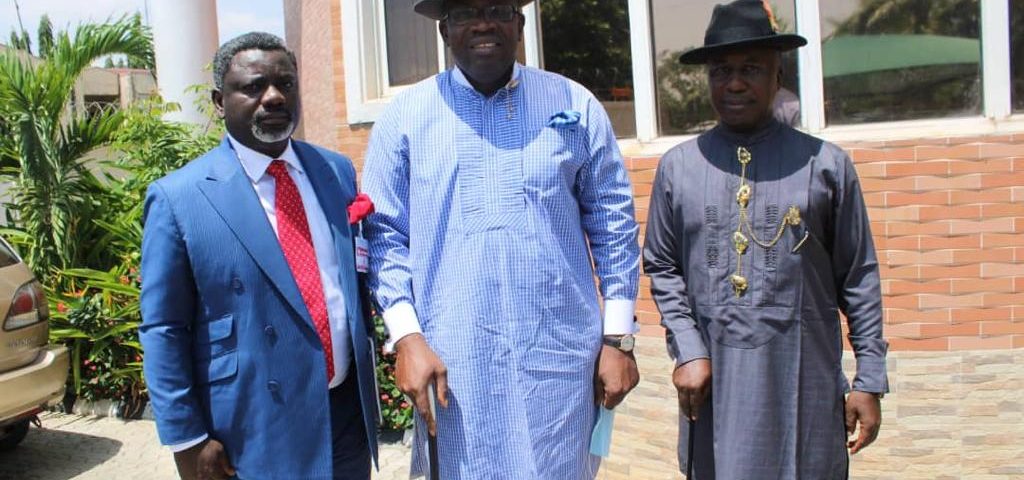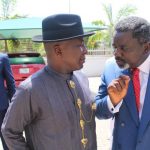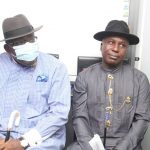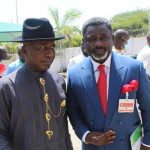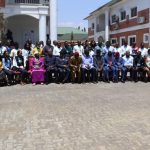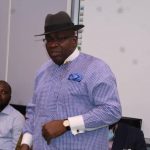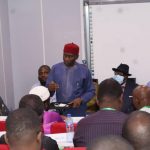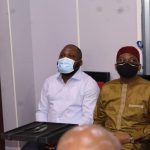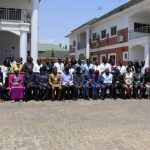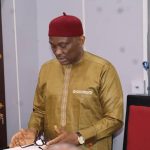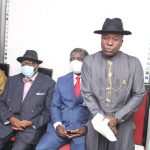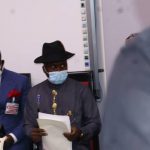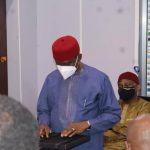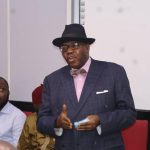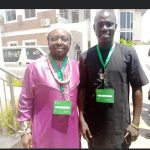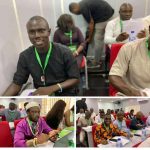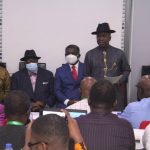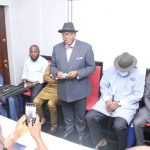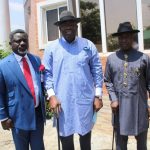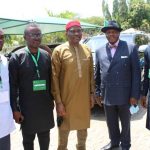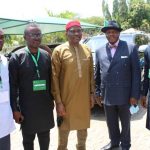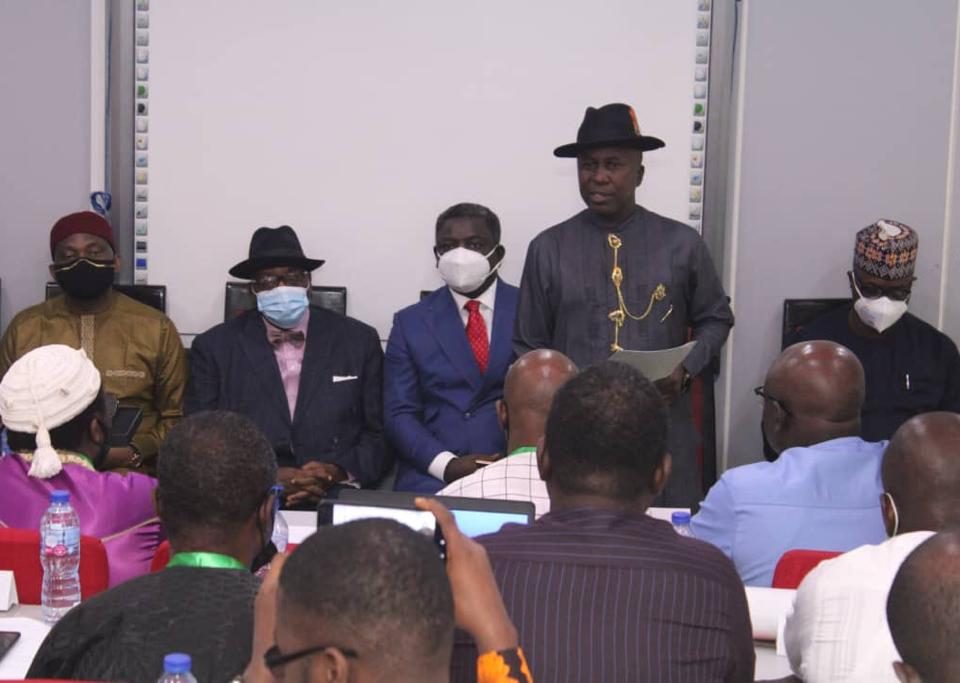
THE DEATH KNELL IN MY CONSTITUENCY
September 15, 2020
Dickson lauds Azaiki on commitment to human capital development
May 26, 2021THE CHALLENGE OF LEADERSHIP IN NIGERIA
A SPEECH DELIVERED BY PROF. STEVE AZAIKI, OON.,TO BAYELSA STATE PARTICIPANTS AT THE LEADERSHIP AND ENTERPRISE TRAINING BY GOTNI LEADERSHIP INSTITUTE (CENTRE), ABUJA ON THE 11TH OF MAY, 2021
The Right Honourable Speaker of the House of Representatives, Olufemi Gbajabiamila; the Minority Leader Hon. Ndidi Elumelu; His Excellency, Senator Henry Seriake Dickson, former Governor of Bayelsa State; Minister of State for Mines and Steel, Hon. (Dr.) Uche Ogah; His Excellency Ambassador Godknows Boladei Igali, Pro-chancellor and Chairman of Governing Council, Federal University of Science and Technology (FUTA), Akure; Deputy Inspector General of Police (DIG), Moses Jitibo; President of Young Professionals, Mr. Seliko Moses; the Chief Executive Officer of GOTNI, Dr. Linus Okorie; other invited guests and participants in this programme,
I am elated to speak to this select-audience of serving and future leaders of Nigeria from Bayelsa State extraction, including my good Constituents from Yenagoa-Kolokuma/Opokuma Federal Constituency, and non-Bayelsans alike.
Permit me to first of all state that, this programme is my personal initiative in collaboration with GOTNI, to sustain my avowed commitment to human capital development and progress of society. It is not a constituency project. It is therefore, not funded by the Federal Government or the House of Representatives.
The crux of my speech, Challenge of Leadership in Nigeria, was chosen at my own discretion, considering that the Chief Executive Officer (CEO) of GOTNI, Dr. Linus Okorie, did not limit me to any topic.
Consequently, while I speak on the topic, I would adopt an experiential approach to the discourse.
This approach will make my presentation practical and lively. It will also enable me share my personal experiences and thoughts on leadership in order to inspire future leaders among the youths.
As was said by Paul of Tarsus, I did not learn under the feet of Gamaliel [or to replace with Nelson Mandela], as such I might not be able to state all that is in the whole gamut of the thorny issue of leadership, the bane of physical and human capital development in Nigeria and Africa.
Therefore, the use of my research works and personal experiences as part of case studies do not mean I would be offering unquestionable wisdom or foreclose discussions on the vast issues of leadership and good governance.
One task for a scholar is to rigorously seek and discover knowledge and make it available for the advancement of mankind and society. Not carrying out these obligations is like a sin and the scholar perishes with the knowledge kept in the cooler.
I have therefore, always considered it necessary to contribute to knowledge and human development, as exemplified by many of my publications, establishment of the Azaiki Public Library, sponsorship of conferences, scholarship awards to deserving persons and active involvement in state and national service.
These are more so, as education, knowledge and experience are useful for effective leadership in Nigeria and Africa.
Looking at Nigeria, the supposed Giant of Africa, many questions come to my mind. Many times I ask myself, what would happen if Tafawa Balewa, Nnamdi Azikiwe, Chief Obafemi Awolowo, Ernest Ikoli, Major Adaka Boro were to rise up and see what is happening now? How would they feel about the country they struggled to gain independence for?
Wouldn’t they be worried at the decaying state and lack of basic infrastructures? Would the near loss of patriotism and people-oriented leadership not disturb their minds?
They would surely be appalled at these problems, and the spate of ethno-religion; regional and political conflicts that have thrown up divisions and insecurity in the country.
The terrorism in the North: particularly in Borno, Adamawa and Yobe States; herders-farmers imbroglio, especially in Benue State; the so-called banditry in Kaduna, Katsina and other states; the booming “trade” in kidnappings in various parts of the country, and the current arsons and war-like situations in the South-East, spreading to the South-South, definitely shock not only Nigerians who are alive, but the nationalists who fought for the county’s independence, would also be unhappy in the world beyond.
And the trend of insecurity is reaching for the crescendo, given foreign and local alarms raised about the influx of foreigners and arms/ammunition into the country, besides the Al-Qaeda-ISIS connections. Yet, the alarms are downplayed, and also not screaming as headlines on the front pages of our newspapers.
As I speak to you, what has been sarcastically code-named euphemistically as Unknown-Gunmen, Known-Gunmen in the South-East is spreading to the South-South, starting with Port Harcourt, and this is becoming worrisome.
Kidnapping has become an occupation in Nigeria. Corruption has become endemic. Boko-Haram terrorists are reportedly planning to annex parts of Nigeria to foist a secular country of its own, on the people.
The truth is that, Nigeria is at war with itself. But it doesn’t seem to have so dawned on the Government, considering how the gory situation of insecurity is not been tackled head-on.
Economic crisis, leading to mass unemployment, poverty and hunger, besides killings and destructions, have made our youths, even graduates, hopeless, trend that occasioned the ENDSARS youth protest, among other reasons.
Our youths have been forced to risk their lives, by indulging in illegal migrations in droves abroad to engage even in illicit acts to try to eek-out a living.
The plight of our youths and the avoidable local and international crimes and vices of prostitution and deceptions, occasioned largely by unresponsive leadership, have given them negative tags abroad. Some of our young men and women are humiliated at embassies of European countries, America, India, China and the UAE.
The plethora of problems confronting Nigeria appears insurmountable, despite the egg heads that abound. There are sound academics and technocrats who could be of help, but the system of leadership and governance has emasculated them.
They could proffer little or nothing in their various fields because of lack of adequate institutional facilities, poor remuneration, lack of support for and utilisation of research outcomes, as well as leaders disdain for knowledge and the intelligentsias.
And the scenario does not augur well in a globalised world where economy and other activities are dominantly knowledge and information communication technology-driven.
The circumstance is worsened by selfish and sectional politics as well as endemic corruption in public and private sector governance.
We are succeeding in creating a generation of beggars in which even master’s and doctorate degree holders have no option than to beg and survive from those not as knowledgeable. Many unemployed graduates are in the streets either doing menial jobs or corporate begging.
Talking about a generation of beggars reminds me of a story – “The Secret of Life”. An old man told his sons that, when you become twelve years old; I will tell you the secret of life. When one of the boys was twelve years old he asked his father to tell him the secret. The father told him that, the cow does not give milk. What are you saying, asked the boy incredulously? Just as you’ve heard it son, the cow does not give milk, you have to milk it. You have to get up at 4a.m., in the morning, go to the field, walk through the coral of manure, tie the tail, hobble the legs of the cow, sit on the stool, place the bucket and do the work yourself.
That is the secret of life; the cow does not give milk. You milk her or you don’t get milk.
The present generation thinks that cows give milk and that things are automatic and free.We are a generation of thinking that texting someone for cash seems to be a means of survival.
Agreed, ineffective leadership and unemployment may have made it so bad, every youth has a responsibility to rise up to the occasion of facing life’s tapestries, by taking your destinies in your hands through hard work, then a push from a helper, could be the stroke of luck to accomplish your destiny.
Those of us who lived (live) in the village know that a hunter who returns from the forest with a goat is a thief. The hunter would be humiliated by being accused and punished.
Everyone is, or could be a leader, and would be applauded or blamed for leading well or not. That is the essence of this leadership training: to groom young leaders, refresh extant leaders and ensure effective and efficient leadership at all strata as well as encourage entrepreneurship. You are trained here today to also serve as agents of social change to other youths and society at large.
Leaders are by definition change makers. When you are called to lead, you are called to advance, move forward and improve the situation.
To be able to lead effectively, you must be prepared for leadership. Most Nigerian leaders, at all levels come to their position of authority at best ill prepared for the office.
Preparation entails education, continuous learning, practice, wide affiliations, mentorships, on-the-job experience, hard work and patience.
To achieve success in leadership, a leader must show discipline, passion, service, purpose, justice, equity and patriotism. A leader, who possesses and applies these principles, could shun tribalism, nepotism, religious bigotry, and injustice. Such a leader will always outperform the leader using intimidation, sadism and inexperience as the tools of trade.
In summary, let me reflect on a book written by one of the greatest minds that ever lived in Africa, “The Trouble with Nigeria”, written by Professor Chinua Achebe. According to him, “The trouble with Nigeria is simply and squarely a failure of leadership”. This is true. It is a statement of fact.
The 19th Century moralist and historian Lord Acton says, “Power corrupts and absolute power corrupts absolutely”. He was writing to Bishop Mandell Creighton in the year 1887. The quotation goes on to say, “Great men are almost always bad men”. More than 100 years earlier, William Pitt, the Prime Minister of Britain from 1766 to 1778, said something similar in a speech to the UK House of Lords in 1770: “Unlimited power is apt to corrupt the minds of those who possess it”.
The moral success and failures of leaders carry a greater weight and volume than those of non-leaders.
It is this opinion that has led me to suggest to my colleagues on the need to rewrite the constitution of Nigeria to make it “We the people…” My purpose at the National Assembly is to pursue restructuring of the country among other things, devolution of ppowers, resource control and ownership as the solution to the countries plethora of problems that are now threatening its corpus existence.
What’s the place of education in leadership? “Education is the passport to the future, for tomorrow belongs to those who prepare for it today.” Your attitude not your aptitude will determine your altitude. “The only person who is educated is the one who has learned how to learn… and change”. Warren G. Bennis.
I love the educational quotes of Malcolm Forbes, when he said “The purpose of education is to replace an empty mind with an open mind”. I believe a leader must have education, not just certificates, because certificates do not really make a leader, even though leadership skills could be taught and learnt.
Indeed, some say there is no truth about genetic leaders. It was Warren Bennis who said, “The most dangerous leadership myth is that leaders are born – that there is a genetic factor to leadership. That’s nonsense; in fact, the opposite is true. Leaders are made rather than born”.
I agree with Klaus Balkenhol when he says “There is a difference between being a leader and being a boss.” Both are based on authority. A boss demands blind obedience, a leader earns authority through understanding and trust”.
Education reminds us of an old African adage that says. “Other people’s wisdom prevents the king from being called a fool”.
Let me conclude that for Nigeria to make progress our leaders must become students of Lee KuanYuu of Singapore the author of “From Third to First”. It will be imperative to look at the leadership style of the Emirates (Dubai) and other countries such as, China, Rwanda, Kenya, India etcetera, as models for us to learn, adopt and adapt to solve our poverty of ineffective leadership.
Apart from learning leadership and governance, other solutions to the turbulence in Nigeria, need to be mooted over.
My conviction is that we need to rewrite our constitution and practice true federalism. We must insert in our constitution, just like Ethiopia did, a section or sections to guarantee the right to secede from the state. Whether it works or not, will depend on the agitating people’s choice in a referendum.
Nigeria must re-establish values of patriotism, brotherhood, nationalism and unity.
We must reward hard work and respect one another.
We need to embark on a paradigm shift particularly in the area of placing little or no emphasis on wealth acquisition, as this singular act negatively affects the psyche of our leaders in the management of public resources. The culture of worshiping wealth has inculcated negative motives and unpleasant behaviours in our youths. And this needs to be curbed.
Let us begin to appoint/elect those who are qualified, capable and disciplined, onto positions of authority in our society.
Ladies and gentlemen, my brothers and sisters from Bayelsa your take home from my long discuss is that you must prepare yourself for tomorrow when opportunity will need to meet preparation.
Thank you, our invited guests, for honouring the invitation to the opening session of this programme.
I must appreciate Dr. Linus Okorie, the CEO of GOTNI, a classic leadership and public speaking outfit in Africa and Nigeria, and his team, for partnering with me on this personal project of mine.
Dear participants, I appreciate your applying to attend this training programme. I urge you to apply the knowledge and skills, as well as train others in the art and science of leadership, to make society a better place.
PROF. STEVE AZAIKI, OON, MHR

